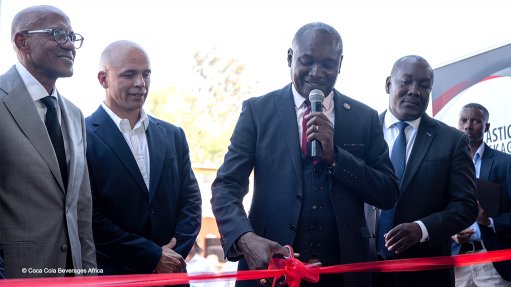International earth observation organisation extended by another decade
The worldwide Group on Earth Observations (GEO) is to continue its work for at least another decade. This decision was taken unanimously at the recent GEO Plenary and Ministerial Summit in Geneva, Switzerland. The group exists to stimulate inter-operability between earth observation systems all around the world, whether space-based, airborne, ground-based or sea-based, and irrespective of which country or institution owns or operates them. The GEO comprises 90 countries, the European Commission (EC) and 77 organisations and associations.
The GEO uses open data to coordinate diverse and separate systems and observations to provide comprehensive data on our planet and the changes it is undergoing. Instead of ‘snapshots’ provided by individual sensors and systems, an overall picture is created, of benefit for everyone. The means of achieving this is the Global Earth Observation System of Systems (GEOSS), which the GEO is charged to create, coupled with a Web portal which gives access to data and other information at little or no cost.
“Rather than snapshot assessments, the GEO gives us moving pictures of a changing planet,” pointed out Chinese Science and Technology Vice-Minister Cao Jianlin. “Our world does not work just in the sea, on land, in the atmosphere or in space, and our policies cannot reflect individual domains either.”
Within the GEOSS, there is room for similar but regional initiatives, and one such for Africa was recently initiated in Addis Ababa. Designated AfriGEOSS, it is intended to reinforce African capacity not only to manage and use earth observation data, but also to produce it as well. It comprises 22 countries and five organisations that already participate in the GEO. “This new initiative gives us the necessary framework to support informed decisions on a range of priorities, including food security, access to clean water and sanitation, natural resources and coastal and disaster management,” stated South African Science and Technology Minister Derek Hanekom.
There is also room for theme-specific cooperation within the GEO. Thus, measure-ment of the effects of human and natural processes on the global carbon cycle will be greatly improved by a programme involving 47 GEO countries, including China, to make unprecedented amounts of data available to researchers. This is the first time such a coordinated programme has been undertaken on a worldwide basis.
“Increasing access to data and data sharing, both nationally and internationally, is crucial for unleashing innovation across our data-driven economy,” affirmed acting US Commerce Secretary Dr Patrick Gallagher. “The GEO’s collaborative work to integrate open data about the earth continues to drive the development of new tools, services and scientific insights that are used around the world to support sound decision-making.”
TheGEO is increasing knowledge of complicated environmental systems and of human impacts, at global, regional and local scale. These range from worldwide observations of ocean acidification to the local footprints created by mining operations. (The aim of the latter is to reduce mining’s impact on the natural environment and on local communities.) In so doing, it is helping to strengthen food security, create strategies for water management and mitigate disasters. It is also stimulating the development of new tools – for example, an early warning system for cholera.
“The GEO is successfully meeting its mandate, which is to make data and other information open, accessible and easy to discover for decision-makers around the world,” high-lighted EC Environment Commissioner Janez Potocnik. “The GEO’s vision is now operational, a proven force for putting sound science to work across nine essential areas: agriculture, biodiversity, climate, disasters, ecosystems, energy, health, water and weather.”
The GEO Plenary took place on January 15 and 16 and the Ministerial Summit, at which the decision to extend the GEO was made, was held on January 17. AfriGEOSS was launched in November last year.
Comments
Announcements
What's On
Subscribe to improve your user experience...
Option 1 (equivalent of R125 a month):
Receive a weekly copy of Creamer Media's Engineering News & Mining Weekly magazine
(print copy for those in South Africa and e-magazine for those outside of South Africa)
Receive daily email newsletters
Access to full search results
Access archive of magazine back copies
Access to Projects in Progress
Access to ONE Research Report of your choice in PDF format
Option 2 (equivalent of R375 a month):
All benefits from Option 1
PLUS
Access to Creamer Media's Research Channel Africa for ALL Research Reports, in PDF format, on various industrial and mining sectors
including Electricity; Water; Energy Transition; Hydrogen; Roads, Rail and Ports; Coal; Gold; Platinum; Battery Metals; etc.
Already a subscriber?
Forgotten your password?
Receive weekly copy of Creamer Media's Engineering News & Mining Weekly magazine (print copy for those in South Africa and e-magazine for those outside of South Africa)
➕
Recieve daily email newsletters
➕
Access to full search results
➕
Access archive of magazine back copies
➕
Access to Projects in Progress
➕
Access to ONE Research Report of your choice in PDF format
RESEARCH CHANNEL AFRICA
R4500 (equivalent of R375 a month)
SUBSCRIBEAll benefits from Option 1
➕
Access to Creamer Media's Research Channel Africa for ALL Research Reports on various industrial and mining sectors, in PDF format, including on:
Electricity
➕
Water
➕
Energy Transition
➕
Hydrogen
➕
Roads, Rail and Ports
➕
Coal
➕
Gold
➕
Platinum
➕
Battery Metals
➕
etc.
Receive all benefits from Option 1 or Option 2 delivered to numerous people at your company
➕
Multiple User names and Passwords for simultaneous log-ins
➕
Intranet integration access to all in your organisation


















